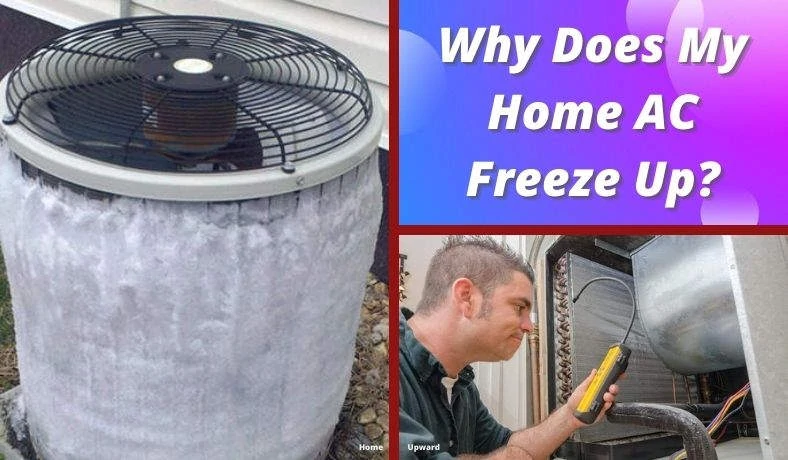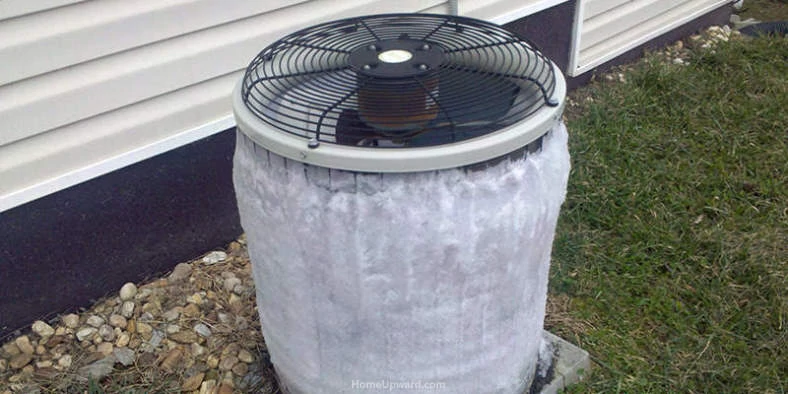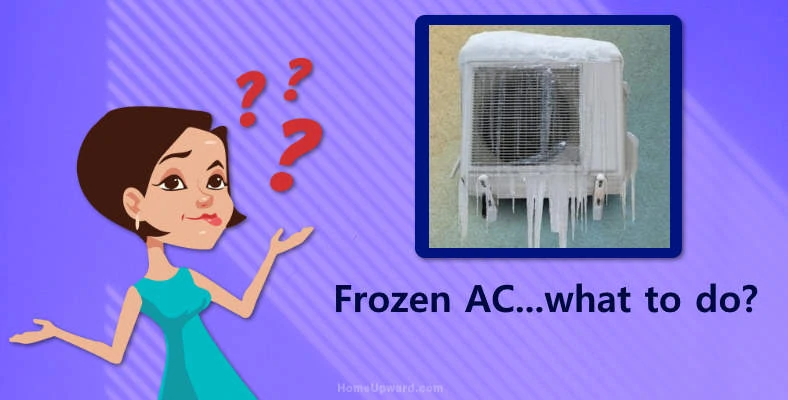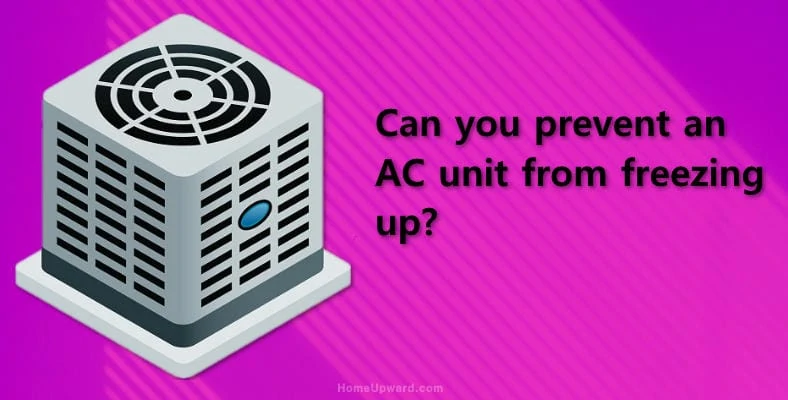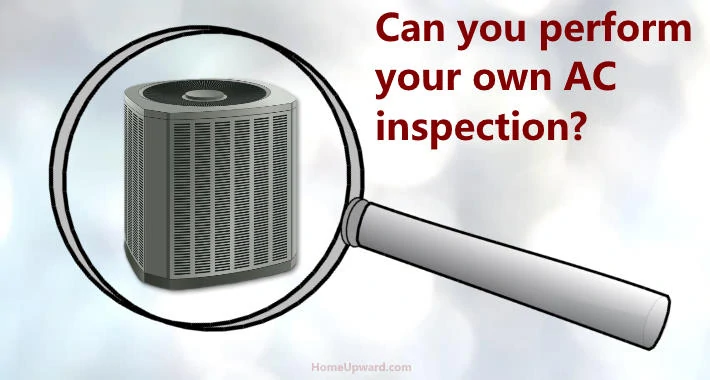Yeah, it’s true we can expect an air conditioner to have a problem sooner or later. However, it can be extremely surprising to find your AC has ice covering parts of it even with the hot weather outside.
In fact, AC that freezes up happens more than you might think. If you’re scratching your head and wondering, “Why does my home AC freeze up?” I’d love to help you understand more.
Contents
Why does my home AC freeze up?
A frozen air conditioning unit can quickly become a bigger problem than you bargained for. Knowing what causes is really helpful because you’ll be a lot more prepared and can get it sorted out, too.
An air conditioner that becomes frozen can form for a variety of reasons. Here are five main reasons AC units can freeze up:
- Poor airflow in the AC unit can create a problem when humidity builds up on the coils and freezes. In the summer, it’s easy to forget about an air filter because they need to be changed more frequently.
- Dirty filters can prevent a good flow of air in the home which can quickly turn into ice where it isn’t wanted.
- Refrigerant plays a really big role in a home AC unit because it helps regulate temperatures. When refrigerant leaks, the evaporator coils can eventually freeze because there isn’t enough of it to remove the heat.
- Dirty air conditioner coils are another reason a home AC unit freezes up. With an extra layer of dirt on the coils, it becomes much more difficult for them to absorb water quickly, allowing ice build up.
- The AC’s blower fan directs cold air where it should be and keep warmer air outside. When there’s a fan problem, it can create excess condensation on the coils and even cause a refrigerant line to freeze up.
- Summer nights can get below sixty degrees depending on where you live. When temperatures drop below that the chance of coils freezing over goes way up.
What to do when your AC unit freezes up
A frozen AC unit is a reason for concern, but following a few simple steps will keep safe and prevent a more costly repair. First, start by turning the unit completely off and letting it defrost.
Don’t try to make it thaw quicker by turning up the thermostat. There are troubleshooting tips that we will discuss, but never start any fixes before allowing the unit to thaw.
Here’s a list of causes & what to do if your AC is frozen:
- Poor airflow: It will typically take between one and three hours for your air conditioner to defrost. Once it has thawed, put on your fan and replace the air filter.
- Leaking refrigerant: A leak often causes low refrigerant levels, but only using a sealant or adding more refrigerant is just a temporary fix. Find the hole where the leak and repair it, or if there are several holes, it may be necessary to replace the entire coil.
- Clean dirty coils: A mixture of warm water and a basic cleaning detergent works well to clean dirty AC conditioner coils. Wipe them clean with a brush or cloth.
- Check your blower fan: There are several things to inspect to see if the blower fan is operational. First, make sure the thermostat is on, check for tripped breakers, or turn off the unit and see if there is an object obstructing the fan blades.
- What to do on cold summer nights: Modern thermostats are capable of being programmed. If that’s the case, set it to turn off once the temperature outside falls below 60 degrees Fahrenheit. If your thermostat isn’t programmable, watch the weather and open the windows on nights when you think it’ll be very cold outside.
How Do You Unfreeze An Air Conditioner?
Turn your thermostat from the “cool” setting to the “off” mode, which will then prevent any cold refrigerant from getting to your unit outside. That situation can wreak havoc on your compressor and is a costly repair should it become damaged.
Switch on the fan control (fan only, not cooling). The frozen AC coils can thaw out more rapidly with warmer air blowing over them. Remember, don’t move the setting to the “auto” mode because the fan only runs when the unit is cooling the home.
It’s a good idea to be aware of overflowing drain pans when the unit is defrosting, so be prepared to place some towels on the floor nearby.
Check and replace a dirty air filter. As mentioned earlier, something relatively routine as a dirty air filter can cause your AC to freeze up. Even a thinner layer of dust and dirt can be the reason for air conditioner issues.
Last but not least, if you can’t find the problem you’ll need to call an air conditioning technician to diagnose and fix it.
Can you prevent an AC unit from freezing up?
If an ac unit freezes up on you, it’s not the end of the world…but there are some things you can do to help prevent it from happening.
1. Check & change AC air filters
Changing the AC air filter on a routine basis can go a long way, and just thin layers of grime or dirt can prevent the warmer air you need to flow over evaporator coils. As a result, the refrigerant inside continues to get colder and eventually freezes up.
Air filters can be changed as often as once per month. Still, the frequency can also depend on other factors such as climate, family member’s current health conditions, pets, and how often you are running the system.
2. Clean the AC unit
As I mentioned earlier in the article, cleaning the evaporative coils and other parts is another way to prevent condensation from building up and eventually causing icing over. It’s an easy step to take and well worth it!
3. Check your air vents
Ensure that you have checked the air vents throughout the household. If you have bulky items like furniture near a vent, be sure they’re not blocking airflow from the vent.
Also, it can be tempting to close a few of the vents to attempt to save money, but don’t close more than three because it can cause the unit to freeze up.
4. Periodic check by an HVAC company
Schedule an HVAC inspection from a local contractor once a year, especially before you’ll be using the AC like right before summer. They’ll check out a number of things that can definitely make a difference.
An inspection can include testing calibration of the thermostat, checking refrigerant pressure, electrical components, the blower, and even the quality of airflow in the home.
Can I Perform An AC Inspection On My Own?
If you feel more comfortable having a professional conduct an inspection, it could be worth the money. However, here are several straightforward steps to check an HVAC unit.
An entire inspection, like the one listed below, is a great idea to have once a year.
- Move the thermostat to the heat and cool position to see if it’s operating correctly. Remove it and clean it with a Q-tip.
- Turn off your system entirely.
- Take a look at the external unit to see if twigs and leaves are lying inside. You can use a wet-dry vac to remove from the inside after removing the cage from the top. Don’t forget to have a clear space between the unit free from shrubs or trees.
- Use a hose to clean the fins and straighten them with a butter knife if necessary.
- Dust the evaporator coil.
What’s The Easiest Way To Keep Your Home AC From Freezing Up?
When in doubt, at least changing the air filter consistently will help keep your home AC running the way you want.
It may be surprising to hear that one of the best ways to prevent your home AC from freezing is by changing the air filter regularly. It’s easy to forget to do this simple step, but make it a point to keep a clean filter in the unit.
Changing it every one to three months is the simplest way to keep your AC working at an optimum level.

